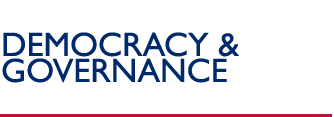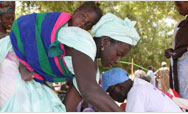Democracy and Governance: USAID/West Africa
The Development Challenge: The ongoing violence and overall deterioration in Cote d'Ivoire, the former "economic powerhouse" of West Africa, symbolizes the fragile and volatile nature of political systems in the region. Political instability and conflict cause investment in development to decline in the afflicted countries and project a negative investment image for the entire region. Development efforts are diverted to the provision of humanitarian assistance for the thousands of refugees and internally displaced persons that conflicts, such as the ones in Cote d'Ivoire, Liberia, and Sierra Leone, leave in their wake. West Africa also faced a new menace this year: the locust invasions in the Sahel. The invasion, the most dramatic since the mid-1980s, posed a serious threat to food security in four countries and demonstrated the limited capacity of the affected countries to effectively handle the onslaught.
The challenges faced by the 18 countries that comprise West Africa are daunting indeed. Thirteen of the 30 countries categorized by the United Nations in their 2004 Human Development Report as "Least Livable Countries" are located in West African. Seventeen countries qualify for the World Bank's Highly Indebted Poor Countries (HIPC) Initiative to reduce their crippling external debt. At the human level, these statistics translate into a frightening 60% of the population of the region struggling to survive on less than a dollar a day. The challenge is underscored by the fact that West Africa's population will increase from 290 million people to 430 million by 2020. Finally, extreme poverty, ineffective state controls, and the illicit exploitation of high-value natural resources, make the region a target for the growth of Islamic extremism, particularly among the region's numerous unemployed and disaffected youth.
The bad news emanating from West Africa is tempered by the clearly demonstrated resolve of the region's premier intergovernmental organizations to tackle the problems. The Economic Community of West African States (ECOWAS) continues to operate peace keeping forces and mediate the conflicts in Cote d'Ivoire, Guinea Bissau, and Liberia. It is also successfully implementing key New Partnership for Africa's Development (NEPAD) projects in trade and energy, most notably the USAID supported $600 million West Africa Gas Pipeline (WAGP), slated to begin construction in 2005, and the West Africa Power Pool (WAPP). The Permanent Interstate Committee for Drought Control in the Sahel (CILSS) led the effort to rapidly assess the impact of the locust invasions on food security in the concerned countries and the organization is gearing up to confront the outbreak predicted for next year. Most dramatically, the heightened resolve of West African governments to improve the conditions under which their citizens live in terms of ruling justly, investing in people, and economic freedom is evidenced in five countries being named eligible for the Millennium Challenge Account (MCA) in FY 2004 and two as Threshold MCA Countries in FY 2004 and FY 2005. Finally, West Africa remains a resource-rich region with enormous reserves of oil, gas, minerals, and other raw materials. These resources, when combined with the positive changes cited above, signal West Africa's potential for a bright future.
It is clearly within the interest of the U.S. Government to retain its demonstrated commitment to the development of a stable and prosperous West Africa. A well-functioning region will make a positive contribution to global conditions in multiple ways including increased trade, expanded democracy, and a decrease in the spread of infectious diseases including HIV/AIDS. West Africa's energy reserves, if managed properly and accountably, are a potential source of economic development and can contribute to global energy markets. Finally, a strong West Africa will also help to avert the forces that threaten the world today; namely international terrorism, sub-regional conflicts, and famine to name but a few.
The USAID Program: The mandate of the West Africa Regional Program (WARP) is to tackle long term development issues that are inherently regional in nature. Thus WARP works closely with the other USAID missions in the region, U.S. Embassies in countries where USAID does not have a mission, and the region's leading intergovernmental organizations such as ECOWAS, CILSS and the West African Economic and Monetary Union (WAEMU) to implement a program that benefits Benin, Burkina Faso, Cameroon, Cape Verde, Chad, Cote d'Ivoire, The Gambia, Ghana, Guinea, Guinea-Bissau, Liberia, Mali, Mauritania, Niger, Nigeria, Senegal, Sierra Leone, Togo, and most recently, Sao Tome and Principe.
The four program areas WARP is concerned with are: 1) fostering regional economic integration and trade; 2) increasing the adoption of effective policies and approaches to reproductive health, child survival, and HIV/AIDS in the region; 3) enhancing capacity to achieve regional food security, improved management of natural resources, and agricultural growth and 4) improving the conditions for peace and stability in West Africa. Continued funding from the Presidential Initiative for Trade for African Development and Enterprise (TRADE) will be used to expand the range of goods traded within the region and exported to the United States under the African Growth and Opportunity Act and to propagate the principles of the World Trade Organization. Further funding from the Presidential Initiative to End Hunger in Africa (IEHA) will be used to implement the new regional market information system that will supply timely agricultural pricing information to farmers and traders. USAID will promote the development of biotechnology policies and regulations as a means of raising agricultural productivity and rural incomes. The three key regional intergovernmental institutions - ECOWAS, CILSS, and WAEMU - have all demonstrated their commitment to working collaboratively on biotechnology. USAID will address the anticipated reappearance of locusts in 2005 with targeted training and the provision of essential equipment to the affected countries.
(Excerpted from the 2006 Congressional Budget Justification for West Africa Regional Program)
Back to Top ^
|


